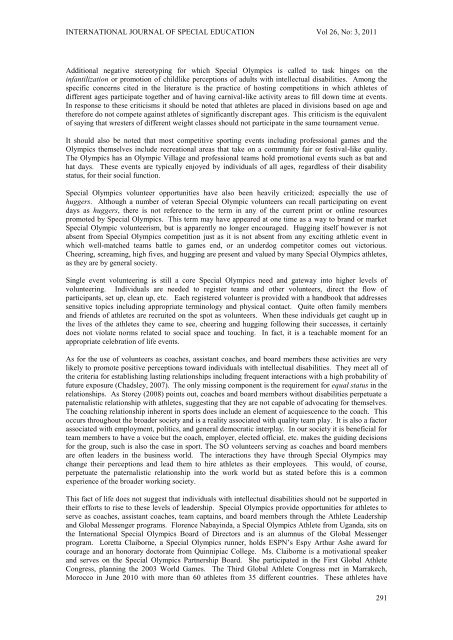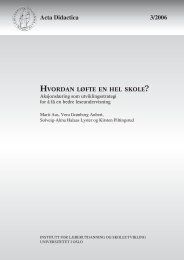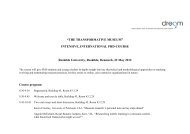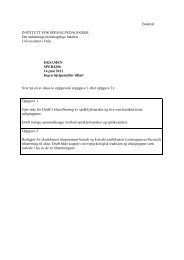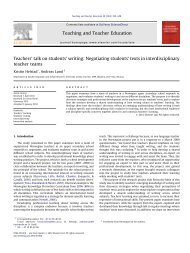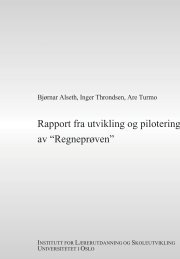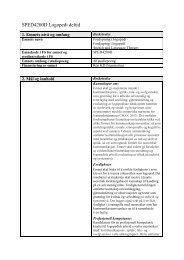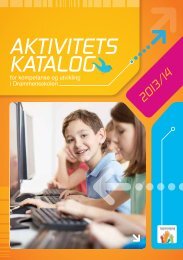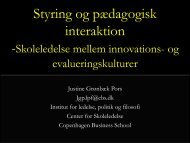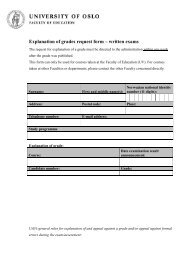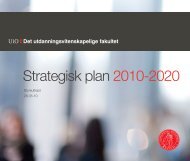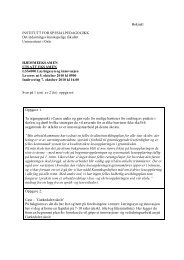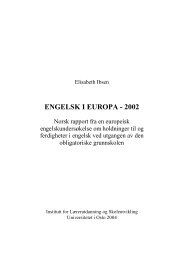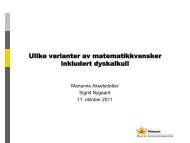International Journal Special Education
International Journal Special Education
International Journal Special Education
Create successful ePaper yourself
Turn your PDF publications into a flip-book with our unique Google optimized e-Paper software.
INTERNATIONAL JOURNAL OF SPECIAL EDUCATION Vol 26, No: 3, 2011Additional negative stereotyping for which <strong>Special</strong> Olympics is called to task hinges on theinfantilization or promotion of childlike perceptions of adults with intellectual disabilities. Among thespecific concerns cited in the literature is the practice of hosting competitions in which athletes ofdifferent ages participate together and of having carnival-like activity areas to fill down time at events.In response to these criticisms it should be noted that athletes are placed in divisions based on age andtherefore do not compete against athletes of significantly discrepant ages. This criticism is the equivalentof saying that wresters of different weight classes should not participate in the same tournament venue.It should also be noted that most competitive sporting events including professional games and theOlympics themselves include recreational areas that take on a community fair or festival-like quality.The Olympics has an Olympic Village and professional teams hold promotional events such as bat andhat days. These events are typically enjoyed by individuals of all ages, regardless of their disabilitystatus, for their social function.<strong>Special</strong> Olympics volunteer opportunities have also been heavily criticized; especially the use ofhuggers. Although a number of veteran <strong>Special</strong> Olympic volunteers can recall participating on eventdays as huggers, there is not reference to the term in any of the current print or online resourcespromoted by <strong>Special</strong> Olympics. This term may have appeared at one time as a way to brand or market<strong>Special</strong> Olympic volunteerism, but is apparently no longer encouraged. Hugging itself however is notabsent from <strong>Special</strong> Olympics competition just as it is not absent from any exciting athletic event inwhich well-matched teams battle to games end, or an underdog competitor comes out victorious.Cheering, screaming, high fives, and hugging are present and valued by many <strong>Special</strong> Olympics athletes,as they are by general society.Single event volunteering is still a core <strong>Special</strong> Olympics need and gateway into higher levels ofvolunteering. Individuals are needed to register teams and other volunteers, direct the flow ofparticipants, set up, clean up, etc. Each registered volunteer is provided with a handbook that addressessensitive topics including appropriate terminology and physical contact. Quite often family membersand friends of athletes are recruited on the spot as volunteers. When these individuals get caught up inthe lives of the athletes they came to see, cheering and hugging following their successes, it certainlydoes not violate norms related to social space and touching. In fact, it is a teachable moment for anappropriate celebration of life events.As for the use of volunteers as coaches, assistant coaches, and board members these activities are verylikely to promote positive perceptions toward individuals with intellectual disabilities. They meet all ofthe criteria for establishing lasting relationships including frequent interactions with a high probability offuture exposure (Chadsley, 2007). The only missing component is the requirement for equal status in therelationships. As Storey (2008) points out, coaches and board members without disabilities perpetuate apaternalistic relationship with athletes, suggesting that they are not capable of advocating for themselves.The coaching relationship inherent in sports does include an element of acquiescence to the coach. Thisoccurs throughout the broader society and is a reality associated with quality team play. It is also a factorassociated with employment, politics, and general democratic interplay. In our society it is beneficial forteam members to have a voice but the coach, employer, elected official, etc. makes the guiding decisionsfor the group, such is also the case in sport. The SO volunteers serving as coaches and board membersare often leaders in the business world. The interactions they have through <strong>Special</strong> Olympics maychange their perceptions and lead them to hire athletes as their employees. This would, of course,perpetuate the paternalistic relationship into the work world but as stated before this is a commonexperience of the broader working society.This fact of life does not suggest that individuals with intellectual disabilities should not be supported intheir efforts to rise to these levels of leadership. <strong>Special</strong> Olympics provide opportunities for athletes toserve as coaches, assistant coaches, team captains, and board members through the Athlete Leadershipand Global Messenger programs. Florence Nabayinda, a <strong>Special</strong> Olympics Athlete from Uganda, sits onthe <strong>International</strong> <strong>Special</strong> Olympics Board of Directors and is an alumnus of the Global Messengerprogram. Loretta Claiborne, a <strong>Special</strong> Olympics runner, holds ESPN’s Espy Arthur Ashe award forcourage and an honorary doctorate from Quinnipiac College. Ms. Claiborne is a motivational speakerand serves on the <strong>Special</strong> Olympics Partnership Board. She participated in the First Global AthleteCongress, planning the 2003 World Games. The Third Global Athlete Congress met in Marrakech,Morocco in June 2010 with more than 60 athletes from 35 different countries. These athletes have291


